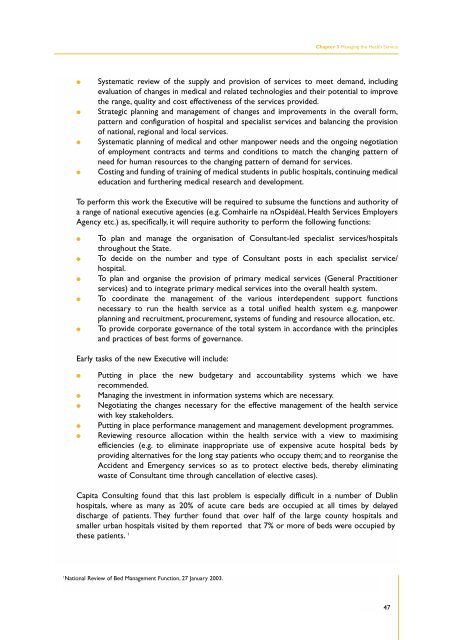Brennan Report - Department of Health and Children
Brennan Report - Department of Health and Children
Brennan Report - Department of Health and Children
Create successful ePaper yourself
Turn your PDF publications into a flip-book with our unique Google optimized e-Paper software.
Chapter 3 Managing the <strong>Health</strong> Service●●●●Systematic review <strong>of</strong> the supply <strong>and</strong> provision <strong>of</strong> services to meet dem<strong>and</strong>, includingevaluation <strong>of</strong> changes in medical <strong>and</strong> related technologies <strong>and</strong> their potential to improvethe range, quality <strong>and</strong> cost effectiveness <strong>of</strong> the services provided.Strategic planning <strong>and</strong> management <strong>of</strong> changes <strong>and</strong> improvements in the overall form,pattern <strong>and</strong> configuration <strong>of</strong> hospital <strong>and</strong> specialist services <strong>and</strong> balancing the provision<strong>of</strong> national, regional <strong>and</strong> local services.Systematic planning <strong>of</strong> medical <strong>and</strong> other manpower needs <strong>and</strong> the ongoing negotiation<strong>of</strong> employment contracts <strong>and</strong> terms <strong>and</strong> conditions to match the changing pattern <strong>of</strong>need for human resources to the changing pattern <strong>of</strong> dem<strong>and</strong> for services.Costing <strong>and</strong> funding <strong>of</strong> training <strong>of</strong> medical students in public hospitals, continuing medicaleducation <strong>and</strong> furthering medical research <strong>and</strong> development.To perform this work the Executive will be required to subsume the functions <strong>and</strong> authority <strong>of</strong>a range <strong>of</strong> national executive agencies (e.g. Comhairle na nOspidéal, <strong>Health</strong> Services EmployersAgency etc.) as, specifically, it will require authority to perform the following functions:●●●●●To plan <strong>and</strong> manage the organisation <strong>of</strong> Consultant-led specialist services/hospitalsthroughout the State.To decide on the number <strong>and</strong> type <strong>of</strong> Consultant posts in each specialist service/hospital.To plan <strong>and</strong> organise the provision <strong>of</strong> primary medical services (General Practitionerservices) <strong>and</strong> to integrate primary medical services into the overall health system.To coordinate the management <strong>of</strong> the various interdependent support functionsnecessary to run the health service as a total unified health system e.g. manpowerplanning <strong>and</strong> recruitment, procurement, systems <strong>of</strong> funding <strong>and</strong> resource allocation, etc.To provide corporate governance <strong>of</strong> the total system in accordance with the principles<strong>and</strong> practices <strong>of</strong> best forms <strong>of</strong> governance.Early tasks <strong>of</strong> the new Executive will include:●●●●●Putting in place the new budgetary <strong>and</strong> accountability systems which we haverecommended.Managing the investment in information systems which are necessary.Negotiating the changes necessary for the effective management <strong>of</strong> the health servicewith key stakeholders.Putting in place performance management <strong>and</strong> management development programmes.Reviewing resource allocation within the health service with a view to maximisingefficiencies (e.g. to eliminate inappropriate use <strong>of</strong> expensive acute hospital beds byproviding alternatives for the long stay patients who occupy them; <strong>and</strong> to reorganise theAccident <strong>and</strong> Emergency services so as to protect elective beds, thereby eliminatingwaste <strong>of</strong> Consultant time through cancellation <strong>of</strong> elective cases).Capita Consulting found that this last problem is especially difficult in a number <strong>of</strong> Dublinhospitals, where as many as 20% <strong>of</strong> acute care beds are occupied at all times by delayeddischarge <strong>of</strong> patients. They further found that over half <strong>of</strong> the large county hospitals <strong>and</strong>smaller urban hospitals visited by them reported that 7% or more <strong>of</strong> beds were occupied bythese patients. 11National Review <strong>of</strong> Bed Management Function, 27 January 2003.47
















